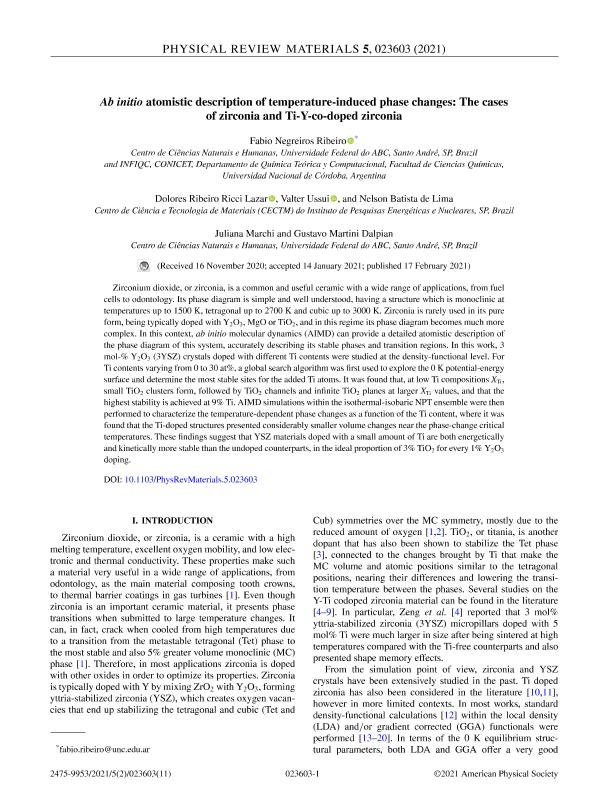Artículo
Ab initio atomistic description of temperature-induced phase changes: The cases of zirconia and Ti-Y-co-doped zirconia
Negreiros Ribeiro, Fábio ; Ribeiro Ricci Lazar, Dolores; Ussui, Valter; De Lima, Nelson Batista; Marchi, Juliana; Dalpian, Gustavo Martini
; Ribeiro Ricci Lazar, Dolores; Ussui, Valter; De Lima, Nelson Batista; Marchi, Juliana; Dalpian, Gustavo Martini
 ; Ribeiro Ricci Lazar, Dolores; Ussui, Valter; De Lima, Nelson Batista; Marchi, Juliana; Dalpian, Gustavo Martini
; Ribeiro Ricci Lazar, Dolores; Ussui, Valter; De Lima, Nelson Batista; Marchi, Juliana; Dalpian, Gustavo Martini
Fecha de publicación:
02/2021
Editorial:
American Physical Society
Revista:
Physical Review Materials
ISSN:
2475-9953
Idioma:
Inglés
Tipo de recurso:
Artículo publicado
Clasificación temática:
Resumen
Zirconium dioxide, or zirconia, is a common and useful ceramic with a wide range of applications, from fuel cells to odontology. Its phase diagram is simple and well understood, having a structure which is monoclinic at temperatures up to 1500 K, tetragonal up to 2700 K and cubic up to 3000 K. Zirconia is rarely used in its pure form, being typically doped with Y2O3, MgO or TiO2, and in this regime its phase diagram becomes much more complex. In this context, ab initio molecular dynamics (AIMD) can provide a detailed atomistic description of the phase diagram of this system, accurately describing its stable phases and transition regions. In this work, 3 mol-% Y2O3 (3YSZ) crystals doped with different Ti contents were studied at the density-functional level. For Ti contents varying from 0 to 30 at%, a global search algorithm was first used to explore the 0 K potential-energy surface and determine the most stable sites for the added Ti atoms. It was found that, at low Ti compositions XTi, small TiO2 clusters form, followed by TiO2 channels and infinite TiO2 planes at larger XTi values, and that the highest stability is achieved at 9% Ti. AIMD simulations within the isothermal-isobaric NPT ensemble were then performed to characterize the temperature-dependent phase changes as a function of the Ti content, where it was found that the Ti-doped structures presented considerably smaller volume changes near the phase-change critical temperatures. These findings suggest that YSZ materials doped with a small amount of Ti are both energetically and kinetically more stable than the undoped counterparts, in the ideal proportion of 3% TiO2 for every 1% Y2O3 doping.
Palabras clave:
DFT
,
Zirconia
,
Phase-Changes
Archivos asociados
Licencia
Identificadores
Colecciones
Articulos(INFIQC)
Articulos de INST.DE INVESTIGACIONES EN FISICO- QUIMICA DE CORDOBA
Articulos de INST.DE INVESTIGACIONES EN FISICO- QUIMICA DE CORDOBA
Citación
Negreiros Ribeiro, Fábio; Ribeiro Ricci Lazar, Dolores; Ussui, Valter; De Lima, Nelson Batista; Marchi, Juliana; et al.; Ab initio atomistic description of temperature-induced phase changes: The cases of zirconia and Ti-Y-co-doped zirconia; American Physical Society; Physical Review Materials; 5; 2; 2-2021; 1-11
Compartir
Altmétricas



